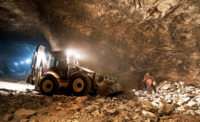After someone gave a foreman at CAM Mining LLC’s Mine No. 28 in Kentucky advance notice of an inspection, the U.S. Department of Labor's Mine Safety and Health Administration (MSHA) took the company to court and got an order prohibiting it from doing so again in the future.
The temporary restraining order issued on June 30 in the U.S. District Court for the Eastern District of Kentucky, Southern Division bars CAM from alerting mine personnel working underground about MSHA inspections “by any means of communication,” according to a statement issued by the MSHA.
The order also prevents CAM Mining from violating, failing or refusing to comply with any order or decision issued under the Federal Mine Safety and Health Act of 1977. Additionally, the judge's order stops the mine operator from interfering with, hindering or delaying an inspection by MSHA by giving advanced notice to any person working underground.
This action stems from MSHA's June 17 attempt to inspect CAM Mining LLC's Mine No. 28 located in Pike County in response to a complaint registered about miners smoking underground on the second shift. When the inspection team arrived at the mine, they gave instructions to mine management that no one was to call underground and alert the miners working there of the inspection. The team then learned that a mine foreman had been notified that MSHA inspectors were outside the mine entrance, giving the miners underground sufficient time and opportunity to hide any smoking materials.
Why smoking matters
The presence and use of smoking materials provides an ignition source which can cause explosions in underground coal mines, so determining whether smoking materials were present and in use at this mine is critical to the safety of the miners. Because of the advance notice, inspectors could not determine whether miners had any smoking materials or were smoking underground.
Section 108 of the Mine Act provides for injunctive relief against noncompliant mine operators who interfere with, hinder or delay inspections of mines by permitting advance notice communicated from the surface operations of mines to persons working underground.
"Unannounced inspections are a key part of MSHA's effort to identify unsafe and unhealthy conditions, and mine operators who interfere with federal inspectors in their attempts to inspect mines threaten the safety and health of miners," said Joseph A. Main, assistant secretary of labor for mine safety and health.

